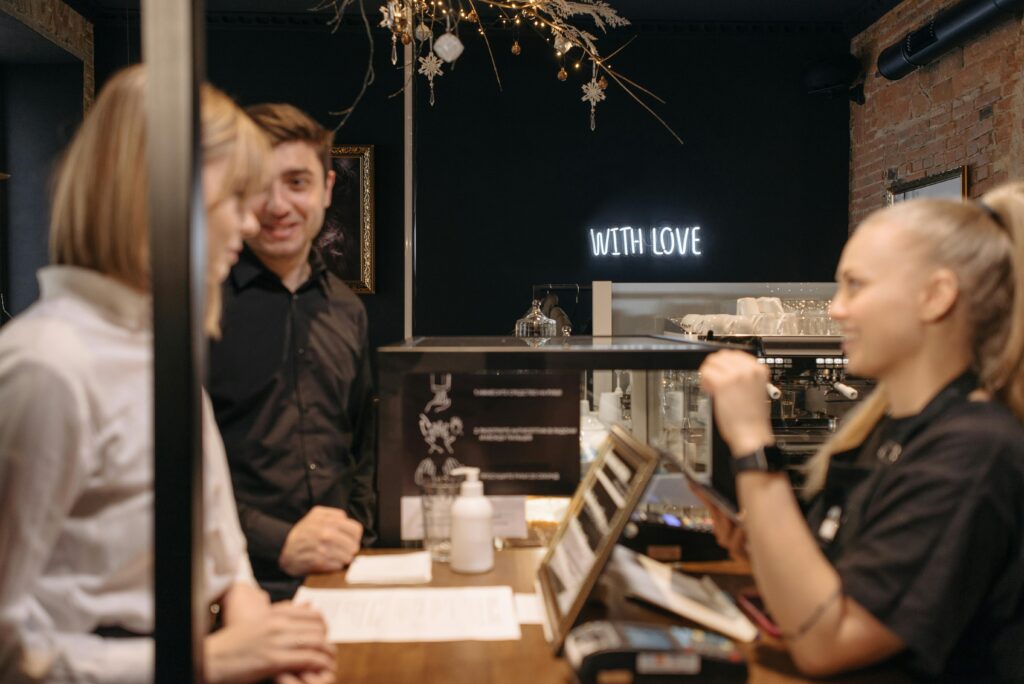I recently had two encounters as a customer with two different businesses.
The first began when I needed a few dollar bills for a special occasion. Rather than hit the ATM and then find a way to break the cash down further, I decided to gather up some loose quarters and head to our bank.
When I asked to turn the quarters into dollars, the teller told me she couldn’t do that for that small amount of coins. I’d need enough to make a roll, and I was halfway short out of luck.
It was no big deal—literally small change. And, I could understand to a degree the bank’s possible point of view: It was a neutral transaction, and of such a small nature that it wasn’t good business from an efficiency standpoint.
That makes sense if you’re the business—but what if you’re the customer? Because in addition to cost, service, amenities, etc. there’s another factor that customers weigh when transacting with a business: how does this business make me feel?
Do I feel welcome? Or maybe I’m getting a different message—that I’m not important enough to deserve even a small courtesy, regardless of how long-term or loyal I might be.
And, it doesn’t matter if I, the customer, am justified or unjustified in the way I feel. Rationally or irrationally, I still feel it. Businesses should always take into account this implied volatility in customer emotions.
Service With a Smile...And More
My other experience happened when I traded vehicles at a national brand dealership. They’re no different marketing-wise from other dealers: they perform outreach campaigns; they offer specials; they set you up months in advance for service. You expect that.
But there was more to this dealer. As I waited for the sales rep to finish my paperwork, everyone walking passed me said hello; asked how I was doing; asked if I had been helped. With a smile. And it wasn’t just sales reps—it was office workers, service techs, and the lady cleaning the offices too.
I didn’t detect fakery—we’ve all got that instinctive BS meter alerting us to deceit. You could tell that it was for them an instilled, GENUINE value—not corporate, “vision statement” pablum—to treat customers as honored guests.
What really got my attention, though, was an exchange between a sales rep and an older couple sitting near me. I was too far to hear the conversation, but I could tell the couple had an issue with whatever deal they were being offered—enough that a manager soon walked over.
Again, I couldn’t hear the details of the conversation, but I did hear his first words as he sat down across from the couple: “How can we make this right?”
Smiling and greeting is one thing—willingness to go the distance to satisfy a customer as best you can, that’s something else.
What's a Customer Worth?
From my view, these two encounters weren’t simply about customer service, customer relations, or even customer satisfaction. They were foremost about value, i.e. the perceived worth of a customer to a business.
Quite frankly, businesses like the bank I first talked about take their customers for granted. That’s not a rant, that’s a reasonable observation. They’re so ingrained in our lives that it seems a toss-up over who needs the other more.
Additionally, it’s a lot harder now than a couple of decades ago to walk into your bank and dramatically announce that you’re closing your account. Unwinding from direct deposits and automatic payments is no easy feat: You have to be pretty disgruntled to go through that ordeal.
Add to that all the sweet services and amenities they offer, and it becomes easier to overlook a thousand cuts of indignity before you’re willing to kill your account. It’s actually not all on the business: In a way, we’ve devalued ourselves as customers for the sake of our convenience.
Still, though, there are businesses like the auto dealer who maintain an “old-fashioned” view of customer relations. Not that “the customer is always right,” because sometimes we’re clearly not. Rather, “You’re valuable to us and we’re going to treat you that way.”
The 'Golden Rule' Applies
Customer relations is a slow turning wheel, but turn it does. Eventually, enough straws of disrespect can fall on aching backs to cause first a trickle and then—if not remedied—a gusher of lost customers. By contrast, consistent nurturing builds momentum: well-treated customers tend to come back, and they often bring their family and friends along with them.
We do well as business owners to keep that uppermost in our minds. When considering actions or practices involving customers, we should first get the feel of their shoes on our own feet.
Maybe we should ask this first before implementing practices: If we were subjected to this as a customer, would we stand for being treated that way? Treating customers as we would want to be treated isn’t just decent and neighborly—it’s plain good business.
![]() David Webster is a copywriter and consultant who creates online marketing content for clients.
David Webster is a copywriter and consultant who creates online marketing content for clients.
You can learn more about David’s services at webstercreative.com

